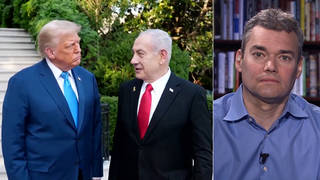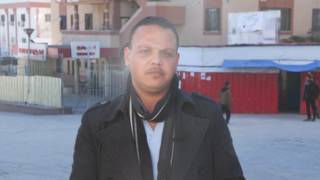
Topics
Guests
- Alfred McCoyprofessor of history at University of Wisconsin-Madison. He is the author of several books, including, most recently, Torture and Impunity: The U.S. Doctrine of Coercive Interrogation.
In this online exclusive, we continue our discussion with University of Wisconsin professor Alfred McCoy on U.S. torture policy, the Obama administration’s refusal to prosecute war crimes, and new revelations that waterboarding was used more often than the government ever acknowledged.
Click here to see part one of this interview.
AMY GOODMAN: We’re now joined by Alfred McCoy, professor of history at the University of Wisconsin-Madison. He’s the author of several books, including, most recently, Torture and Impunity: The U.S. Doctrine of Coercive Interrogation. His past books include A Question of Torture and Policing America’s Empire.
Talk about what was found in Somalia. And what is the kind of information that’s being used now?
ALFRED McCOY: Sure. The Somalia incident, I think, represents a continuity of rendition policy from President Bush to President Obama. Under President Bush, the CIA began funding the establishment of this prison inside the basement of Somalia security in Mogadishu. And they began snatching terror suspects from cities and slums across East Africa, where, as you know, al-Qaeda has been very active bombing U.S. embassies and the rest. And these suspects are flown to this prison, where they are under the custody of Somali authorities, but we pay the guards. The CIA pays the guards. And they have unlimited access to the prisoners and to the intelligence being harvested by the Somali guards’ interrogation of the detainees. This started under President Bush. It is continued under President Obama. And it is an example of rendition to a country where we cannot be certain that human rights are being observed, therefore it’s a clear violation of Article 3 of the U.N. Convention Against Torture.
So, when you add this up, when you combine this with our policy of turning over suspects to Afghan National Directorate of Security, where we’re absolutely certain, after the U.N. investigation, they’re being tortured, and our policy in Iraq right up 'til 2009 of turning over detainees to Iraqi authorities where we knew they were being tortured and having over a thousand incidents of U.S. authorities finding human rights abuse and then ignoring it, it's a clear policy, OK, of outsourcing torture to our allies. And so, it represents, under the Obama administration, not a fulfillment of the international standard of human rights, but simply going back to that bipartisan Cold War policy with that contradiction of proclaiming our commitment to human rights publicly, but privately working with allies to outsource human rights abuse, to outsource torture, and to harvest the intelligence.
AMY GOODMAN: Earlier this month, Human Rights Watch revealed that U.S. officials, under President Bush, tortured a number of Libyan prisoners before being—sending them back to Libya for further abuse under the regime of Colonel Muammar Gaddafi. The report’s author, Laura Pitter, said the Libyans suffered worse torture by U.S. officials than they did under Gaddafi.
LAURA PITTER: The U.S. and the U.K. had assisted and actually took part in their renditions. These were individuals who were head of an opposition group who had been opposed to Gaddafi for many years and had been trying to overthrow him from abroad, from various bases abroad. The treatment in Libya was very bad. They were subjected to more isolated incidents of abuse and beatings, and some received electric shocks and summary trials and solitary confinement. But it was, ironically, not as bad as what they received in U.S. custody.
AMY GOODMAN: Human Rights Watch also revealed that some of these prisoners were waterboarded.
ALFRED McCOY: Yes, indeed. I read the report and the press copies of the report. This is a consistent pattern. First of all, it adds to the number of people we knew that were waterboarded by the CIA. We thought it was only three of them. Now it apparently—there were more. And once you uncover more, that raises the possibility of many, many more. OK?
I’m not surprised that the treatment of these detainees under U.S. custody was worse than they might have confronted, let’s say, in Gaddafi’s prison. There were kind of two phases after 9/11 of CIA abuse. There was an initial phase in 2002 and 2003 when the CIA was opening up the black sites. The procedures were not well established. And we were rounding people up around the world, putting them in these facilities, without much in the way of effective oversight or established procedure. And according to the CIA inspector general report which came out in 2004, there was an extraordinary amount of abuse and treatment that was a clear violation even of U.S. law for the treatment of detainees and the conduct of interrogation. People were being threatened with the murder or sexual assault of female relatives. They were being slammed up against walls, guns put to the head, electrical drills put to the head—this sort of bizarre treatment. And the waterboarding got right out of control. We know that Khalid Sheikh Mohammed was waterboarded in excess of a hundred times, way beyond the regulations.
Then, in a second phase, once the CIA inspector general investigated in 2004 and found this pattern of abuse, then they kind of bureaucratized it and regularized it and went to a fixed set of procedures, which, I think any human rights investigator would agree, constitute a violation of the U.N. Convention Against Torture. But at least the extreme abuse, the kind of psychopathological abuse during the first phase, was controlled.
AMY GOODMAN: Professor McCoy, in your book, you explore how the U.S. mass media has glamorized, has normalized acts of torture in shows like, for example, the famous show 24. Kiefer Sutherland, the star and the executive producer, he plays a character named Jack Bauer, who became the embodiment of the infamous ticking time bomb argument for torture. However, Kiefer Sutherland himself said he does not advocate torture or even keeping Guantánamo, the prison there, open. He was speaking on Charlie Rose, on the PBS broadcast, and this is how he justified the show’s depiction of torture.
KIEFER SUTHERLAND: The torture is a dramatic device to show you how desperate a situation is—
CHARLIE ROSE: Right, right.
KIEFER SUTHERLAND: —and how urgent and desperate these characters are to solve this one specific thing, and time is running out. And so, it is a dramatic device. It is not to be confused with what we think is right or wrong. And it’s a television show.
AMY GOODMAN: That’s Kiefer Sutherland. It’s a “dramatic device” in film.
ALFRED McCOY: It’s not just a dramatic device in film. What we went through in the five years after 9/11, from 2002 to about 2007, was that on screens large and small across America, we were awash in positive images of torture. Let’s just take television. Before 9/11, there were about 20 torture incidents a year shown on prime-time American television. These were all done by bad guys, Nazis, drug dealers, OK? After 9/11, American television shows, in sum, showed an average of 150 incidents of torture. And these were incidents done by the good guys, often American federal agents, defending the nation.
Not only was 24 showing torture, but there was also some very big box office films. Casino Royale has as its kind of dramatic center point a homoerotic torture scene of Daniel Craig, his body shaved of hair, stripped naked, being generously tortured by the evil Le Chiffre beating his genitalia with a knotted rope. The Passion of the Christ takes a dozen words in the gospels and transforms that into eight minutes of the most brutal, gruesome physical torture that turns the body of Christ into a suppurating mass of bleeding lesions. I mean, the World of Warcraft 2 came out, two million copies sold right out of the box, with a torture program built right into the game. You know, we were awash in it.
What was the point of this? It served, in some, to normalize torture for Americans. Torture was not—was transformed from a crime, an aberration, an abomination, into something that was necessary—and even arousing, in a dark way. I mean, Kiefer Sutherland’s body was displayed, Daniel Craig’s body was displayed, in the conventions virtually of homoerotic pornography. This was, you know, appealing to the darkest recesses of the human mind.
AMY GOODMAN: Professor McCoy, the significance of WikiLeaks and how it plays into all of this?
ALFRED McCOY: Well, WikiLeaks, first of all, has provided us with information, I think very importantly. In the release of the hundreds of thousands of diplomatic cables, if you go through them, as people have done—I’ve done it, as well—what you can find is the U.S. using its extraordinary diplomatic power, first under Bush and now under Obama, to stifle those investigations, particularly in Spain, by Judge [Bartasar] Garzón. We placed enormous diplomatic pressure to end Spain’s exercise of universal jurisdiction to investigate top Bush administration officials—Donald Rumsfeld, Vice President Cheney and others—for human rights abuse. You know, we leaned on the Spanish authorities very hard.
Germany is another area where progressive lawyers, the RAV, the Republic Lawyers Association, has tried on several occasions to file a case and get the German government to exercise its universal jurisdiction, under the European human rights convention and the U.N. Convention Against Torture, to investigate and possibly indict American officials for their crimes of torture. The German government has twice, in part in response to U.S. diplomatic pressure, failed to do this, refused to do it. And the WikiLeaks cables provide us with the diplomatic evidence of the U.S. doing this. And I use those cables in my book, Torture and Impunity, to describe this process.
AMY GOODMAN: Bradley Manning, the person who’s accused of getting those documents to WikiLeaks, who is held now for three years and has yet to be tried?
ALFRED McCOY: Well, more disturbingly, the initial part of his incarceration, when he was first arrested, before he was transferred to a conventional military prison, was done under ways that aroused concern by the U.N. rapporteur for human rights, the U.N. rapporteur for torture. And he actually expressed concern to the United States government.
Bradley Manning was stripped naked. He was held round the clock in isolation. The combination of nudity and isolation are techniques that are a part of the U.S. doctrine of coercive psychological interrogation. It’s a form of torture.
AMY GOODMAN: Two last questions, one about the CIA agents who have been convicted in absentia. What about what you feel President Obama should be doing about this?
ALFRED McCOY: Well, President Obama has to act, OK? Look, through that five-stage process I described, the United States has perfected impunity. We have closed down any investigation of the CIA agents. We’ve rewritten the past to convince the American public that this was absolutely necessary for our national security. We’re done, OK? We’ve wrapped it up, OK. Nothing more will be done. But in the globalizing age, in the age of the International Criminal Court, of the U.N. Convention Against Torture, even the most perfect impunity inside one nation’s borders cannot stand, because of universal jurisdiction.
Now, one of the key elements in universal jurisdiction is the courts abroad, in Spain, in Germany, will not take the petition if a sovereign state is doing due diligence. Either they haven’t had enough time, or they haven’t completed their investigations. And so, Spain and Germany have turned back the universal jurisdiction petitions by activist human rights lawyers on the grounds that the United States hasn’t had time yet. Well, now the United States has had time, and the United States has definitively decided not to proceed. That means that these cases, like the Italian case, and other investigations can proceed. It’s not over. It may be over here in America, but the world is wide, and it knocks at our doors.
AMY GOODMAN: What do you think of the assassination of Osama bin Laden?
ALFRED McCOY: The claims made by that a cappella chorus of Republican neoconservatives that the enhanced interrogation, CIA torture, led the Navy SEALs to the door of Osama bin Laden is absolutely specious. Senator John McCain was shown the evidence, and he announced publicly that there was no basis for that claim. But—
AMY GOODMAN: But the actual assassination of him?
ALFRED McCOY: The actual assassination—oh, the actual assassination of Osama bin Laden is part of a larger pattern of—a very unfortunate pattern of using drones inside Pakistan to kill roughly 2,400 people. Let’s look at the eerie parallel. During the Battle of Algiers back in 1957, '58, French authorities used torture to break the National Liberation Front inside the Casbah, the old city of Algiers, and to avoid what one French general called clogging the machinery of justice. When they were done with these people, they couldn't be brought before the courts, because their testimony would not have had any validity. So 3,000 people were killed and dumped in the desert in shallow graves. Well, that 3,000 figure of the French in Algiers has an eerie resonance with the 2,400 suspects that we’ve killed with drones in the Pakistan borderlands, and the parallel, an eerie parallel. At the same time, the Obama administration has added nobody new to Guantánamo. So, in effect, what we’re doing is what the French did. We’re not clogging the machinery of justice with these suspects; we’re simply killing them.
AMY GOODMAN: What were you most surprised by, Professor McCoy, in your research for your book, Torture and Impunity?
ALFRED McCOY: What I was surprised by was the silence surrounding it. We’ve gone through this absolutely extraordinary decade in American political history, where the American state, in its majesty, adopted torture as one of the weapons in its awesome arsenal of power. And having debated that and argued about that and had that exposed, OK, we’ve reached this sort of ad hoc bipartisan compromise of impunity at home and rendition abroad. And the American people seem oblivious, seem absolutely unaware, that this is our bipartisan policy. And those two policies cannot stand in an era of universal jurisdiction and universal human rights. And so, we’ve reached a bipartisan compromise which satisfies the imperatives of American politics, but will not and cannot be sustained in the international community.
AMY GOODMAN: And how you write about psychological torture and public forgetting?
ALFRED McCOY: We’re now in an era where we are consigning this to the past, to our oblivion. But the world has not forgotten. And that’s one of the—I think, the signal lessons of that Italian Court of Cassation, the Italian sort of supreme court, ruling just this week, confirming the conviction of those 22 CIA operatives. The world is not going away, OK? This is not over.
AMY GOODMAN: Professor McCoy, I want to thank you very much for being with us. Professor McCoy, author of Torture and Impunity, professor of history here at the University of Wisconsin-Madison.












Media Options